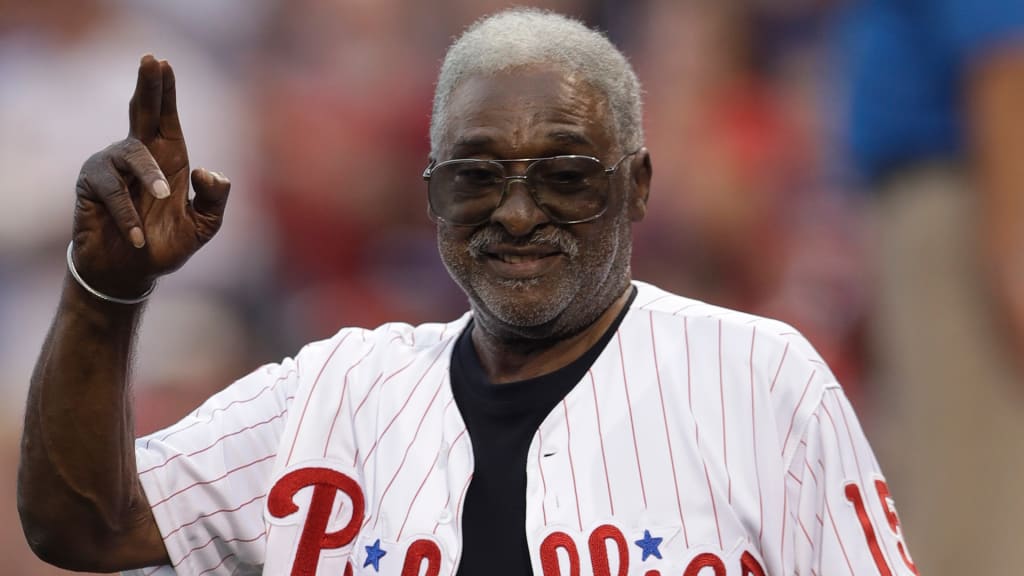
PHILADELPHIA -- The Phillies like Dick Allen¡¯s chances of finally making the Hall of Fame in December.
But that is not why they announced Thursday that they will retire his No. 15 in a Sept. 3 ceremony at Citizens Bank Park. No, the Phillies will retire Allen's number because they believe he is a Hall of Fame-caliber player and because he deserves it, whether or not his name appears on 12 of 16 Golden Days Committee ballots to be inducted into the Hall in July 2021.
¡°I think he was just kind of stunned, to be honest with you,¡± Phillies managing partner John Middleton said Thursday. ¡°I think for him, he always hoped to have a jersey retired and make the Hall of Fame but had maybe given up hope of that happening. I think when that gets presented to you, your first reaction is almost disbelief. I think he was nonplussed.¡±
The announcement revealed an important policy shift in how the organization will handle number retirements in the future.
¡°What does that mean for everybody else?¡± Middleton said. ¡°Well, it means you don¡¯t have to be in the Hall of Fame. Now, I hope Dick gets there. I think he should get there, but part of the reason I wanted to do this in advance of that is I wanted it to be a statement. I want Dick to know, and other players to know, that this is the policy that says if you¡¯re good enough -- and Dick is certainly good enough -- you can certainly have your jersey retired. I think he¡¯ll make it -- I hope he makes it -- but if he doesn¡¯t, his jersey is still going to be retired, because he¡¯s earned it.
¡°The other players have to meet that standard. It¡¯s not about personal preference. It¡¯s not about who John Middleton likes. It¡¯s trying to take bias out of it. It¡¯s trying to inject objectivity into the process. This needs to be done rigorously and thoughtfully so everybody¡¯s got a shot, but you have to hit the standard.¡±
Objectively, Allen should be in Cooperstown. He slashed .292/.378/.534 with 351 home runs, 1,119 RBIs, a .912 OPS and a 156 OPS+ in a 15-year career with the Phillies, Cardinals, Dodgers, White Sox and A¡¯s. He won the 1972 American League Most Valuable Player Award and the '64 National League Rookie of the Year Award. He made seven All-Star teams, including three with the Phillies, and earned MVP votes in six other seasons. From 1964-74, Allen posted a 58.3 WAR, according to Baseball Reference. It tied Willie Mays for sixth place among position players in that 11-year span, behind Hank Aaron (68.8), Carl Yastrzemski (68.1), Roberto Clemente (64.7), Ron Santo (60.1) and Brooks Robinson (59.3).
Pete Rose (58.0), Frank Robinson (55.4) and Joe Morgan (54.0) rounded out the top 10.
But Allen never got serious consideration from the Baseball Writers¡¯ Association of America, inexplicably dropping off the ballot after just one year in 1983. He fell one vote short of induction in 2014, when the Golden Era Committee met.
The Phillies previously had an unofficial policy that they only retired numbers of players in the Hall of Fame. But Middleton has been thinking for the past 20 years about players that could or should have their numbers retired. When he became managing partner a few years ago, he started to think about that policy.
Middleton finally wrote a formal one.
It is nearly four pages long, and it discusses his philosophy about retiring jerseys, the Phillies¡¯ history of retiring jerseys and the inconsistencies of the previous policy. It then lays out criteria for future number retirements.
¡°Philosophically, there are three ways I see for the retired Phillies [alumni] to be honored,¡± Middleton said. ¡°First is the Wall of Fame. The last is the Hall of Fame, which is the greatest. In between those two is a retired jersey. My view is that there should be that second step. There shouldn¡¯t be just the Wall of Fame and then the Hall of Fame. There¡¯s something actually in between that you can honor people who are great players, terrific players, but they may not make the Hall.
¡°In my view, the standards to retiring a player¡¯s jersey needs to be stringent, and they are much closer to being in the Hall of Fame than they are to being just on the Wall of Fame. I say a player has to be Hall of Fame-worthy -- legitimately, credibly, Hall of Fame-worthy. It¡¯s not a hope and a whiff.¡±
Middleton uses Allen as an example. Allen has a 58.8 career WAR, according to Baseball Reference, and a 35.4 WAR with the Phillies.
¡°If you look at all players in the Hall of Fame, Dick would be around 140 out of 260 players, which means there¡¯s 125 players after Dick; below Dick¡¯s WAR,¡± Middleton said. ¡°You¡¯ve got to be at that level. This just isn¡¯t something that is going to happen because you¡¯re a nice guy. And that¡¯s why I said, 'You have to put it in writing.' The purpose of this, ultimately, is to define a new standard. It¡¯s to create structure and discipline around the decision, and in the decision to ensure that all players are considered fairly and consistently and equitably.
¡°I think this should be an attainable goal for people who fall short of the Hall of Fame. I think it should give them something to shoot for. I think that¡¯s good for the players. I also think it¡¯s good for the fans.¡±

